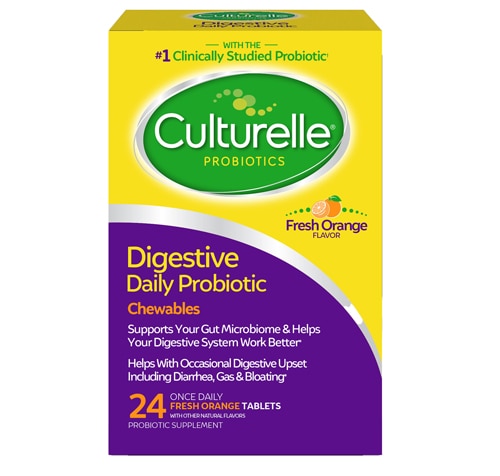[vc_row][vc_column][vc_column_text]Maintaining a healthy gut promotes overall health throughout your life, but supporting your microbiome may be even more important in your later years. As you age, the balance of microbes in your gut appears to
shift toward a pro-inflammatory state. Known as dysbiosis, this shift is associated with several conditions that often develop with age, including heart disease, diabetes and Alzheimer's.

The connection between aging and gut health
Age-related microbiome changes don't happen overnight. Instead, the balance of beneficial and pathogenic gut microbes
goes through stages over time. The gut environment you have as a teenager is different from the one you have in middle age, which is different from the one you have in your senior years.
Changes occur in both diversity—the number and types of microbes in your gut—and the abundance of specific microbial families and species. Researchers have even
observed differences between the younger old, defined as adults 60-89 years, and the oldest old, those who live to 90 and beyond.
Gut microbiome, aging and disease risk
Changes in microbial composition can affect
fundamental biological functions like regulating immunity, detoxifying harmful compounds, synthesizing vitamins and amino acids and breaking down fiber to create health-promoting compounds, which may explain why age-related dysbiosis appears to influence the development of multiple diseases.
Brain health and cognition
Beneficial microbes that produce short-chain fatty acids (SCFAs) appear to decrease with age, which reduces SCFA production. SCFAs play a key role in keeping both the gut barrier and the blood-brain barrier healthy and strong. The combination of fewer SCFAs and more pathogenic bacteria can promote inflammation, which
damages these barriers and makes them "leaky," a condition known as increased permeability.
Permeable membranes can allow pathogens, amyloid proteins and pro-inflammatory compounds like lipopolysaccharides (LPS) to pass from the gut, through the bloodstream and
into the brain. The resulting inflammation and damage may promote the development mood disorders, age-related cognitive decline and Alzheimer's disease.
Dysbiosis-induced changes in amino acid metabolism can also affect brain function because many amino acids act as neurotransmitters. Reduced neurotransmitter production may negatively impact mood or contribute to conditions like
anxiety and depression.
Muscle and bone health
Lower SCFA levels are associated with
reduced muscle mass and increased frailty in older people. This may be due to the role that inflammation and oxidative stress play in muscle loss; as SCFA producers decrease, so does their anti-inflammatory activity. If pathogenic gut microbes also become more abundant, it creates a pro-inflammatory state that can affect muscle maintenance.
Inflammation may also contribute to poor bone health.
Higher inflammatory markers often accompany the symptoms of osteoporosis, so anything that drives inflammation—including dysbiosis—could have an impact on bone mass.
Cellular senescence
Senescence is a lesser-known but important factor in aging. When a cell reaches a senescent state, it stops dividing but doesn't go through the natural process of cell death. Instead, it can begin to secrete a combination of pro-inflammatory compounds, protein-degrading enzymes and growth factors, creating a state called the
senescence-associated secretory phenotype (SASP).
The number of senescent cells increases with age, perhaps due in part to changes in the gut microbiome. Dysbiosis can increase the production of pro-inflammatory compounds that
affect the gut barrier, which may lead to cellular damage elsewhere in the body. Senescence itself may perpetuate the cycle by
increasing inflammation that contributes to barrier damage and dysfunction.
Cardiovascular health and disease
An increased abundance of pathogenic gut bacteria characteristic of dysbiosis can promote inflammation, raise triglyceride levels and
lower beneficial HDL cholesterol. Along with reduced microbial diversity, this state is also associated with the formation of plaques that can restrict blood flow to the heart or rupture and cause a heart attack.
SCFAs appear to affect heart health, too. People with cardiovascular disease tend to have
fewer SCFA-producing bacteria in their guts, which can increase inflammation and promote lipopolysaccharide release. LPS that enters the bloodstream may trigger the
arterial inflammation and damage that leads to plaque formation.
Immune function and inflammation
It's no coincidence that inflammation is a theme in the diseases associated with age-related changes in gut health. Because the microbiome is directly involved in immune cell training and maturation, a shift toward dysbiosis can
affect immune function and
increase pro-inflammatory responses. An inflammatory state contributes to gut barrier permeability, which allows more pro-inflammatory compounds to pass into the bloodstream and further aggravate the immune system.
Keeping your gut microbiome healthy as you age
Researchers still aren't sure exactly why the gut microbiome shifts with age or whether disease is the cause or result of these changes. Age-related changes in lifestyle and environment, such as taking more medications or moving to an assisted living facility, may also contribute to the development of dysbiosis. More research is needed to determine how or if external factors affect the microbiome in seniors and the elderly.
Some research suggests that an age-related decline in gut health isn't inevitable. Studies show that the microbiomes of people who live into their 90s and 100s may be more diverse and have a
greater potential to produce SCFAs. Since diet and lifestyle can affect both factors, it may be possible to preserve gut health later in life by establishing and maintaining healthy habits, including:
- Eating a high-fiber, plant-strong diet abundant in vegetables, fruits, legumes, whole grains, nuts and seeds to feed beneficial bacteria and drive SCFA production
- Avoiding high-fat and ultra-processed foods, which may increase inflammation and promote the growth of pathogenic gut microbes
- Maintaining and active lifestyle that includes regular exercise to boost beneficial gut bacteria
- Getting adequate sleep to reduce inflammation and support a strong gut barrier
[/vc_column_text][/vc_column][/vc_row][vc_row][vc_column][vc_text_separator title="Featured Products" border_width="2"][vc_row_inner equal_height="yes" content_placement="middle" gap="35"][vc_column_inner width="1/3"][vc_single_image image="179209" img_size="full" alignment="center" onclick="custom_link" img_link_target="_blank" css=".vc_custom_1729896694978{padding-right: 7% !important;padding-left: 7% !important;}" link="https://www.vitacost.com/snap-supplements-gut-health"][/vc_column_inner][vc_column_inner width="1/3"][vc_single_image image="179208" img_size="full" alignment="center" onclick="custom_link" img_link_target="_blank" css=".vc_custom_1729896710690{padding-right: 7% !important;padding-left: 7% !important;}" link="https://www.vitacost.com/gaia-herbs-gut-revival"][/vc_column_inner][vc_column_inner width="1/3"][vc_single_image image="179207" img_size="full" alignment="center" onclick="custom_link" img_link_target="_blank" css=".vc_custom_1729896727201{padding-right: 7% !important;padding-left: 7% !important;}" link="https://www.vitacost.com/cymbiotika-probiotic-prebiotic-probiotic-gut-health"][/vc_column_inner][/vc_row_inner][/vc_column][/vc_row]




